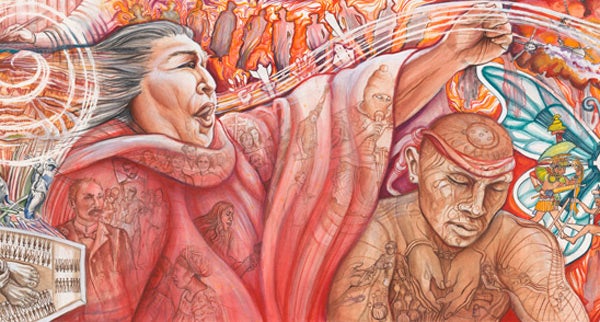|
November 28, 2012
International mural artist creates a space for Stanford students to celebrate their Latin American identities
The Spiral Word: El Codex Estánfor, a four-part mural at El Centro Chicano, marks Juana Alicia's return to campus. By Robin Wander

The new mural at Stanford's El Centro Chicano depicts the legacy of Latin American and indigenous literature. (Photo: Courtesy of El Centro Chicano)
Earlier this month, Stanford inaugurated its newest campus mural, The Spiral Word: El Codex Estánfor, at El Centro Chicano, the university’s Chicano/Latino student center. The mural was designed and created by Berkeley-based international muralist Juana Alicia, who was on hand for the ceremony.
The event celebrated the moment when the four-part mural left the artist's hands and was entrusted to the current and future generations of Stanford students, faculty and staff.
Juana Alicia's friend and poet Rafael Jesus González burned sage and blessed the seven directions of the Mayan tradition (the cardinal points, earth, sky and center) and then read his moving poem, Flor y Canto. He also shared poignant words about education and social responsibility with those assembled.
Student Cesar Torres, graphic designer of the mural guide produced for the occasion, offered his reflections on the work and senior Aracely Mondragón read three powerful poems inspired by the mural. The artist discussed her process along with the subtext, symbolism and deeper meanings of her work.
El Centro Director Frances Morales observed that since the installation last spring, the mural has inspired creative expression within the Stanford community, as evidenced by the poems and reflection written and shared by Torres and Mondragón (both from the class of 2012) during the inauguration. In addition, Morales said that some faculty members have begun to think of ways to incorporate a viewing and study of the mural into their classes.
Imagery inspired by literature
The dazzling mural depicts the legacy of Latin American and indigenous literature. The concept for the suite of four murals for El Centro was inspired by the history and literature of multi-ethnic Latin America, from the ancient stories of the Popol Vuh to modern Chicana/o poetry. California Poet Laureate and Stanford alumnus Juan Felipe Herrera named the work.
Juana Alicia was inspired by a wide range of literary sources including José Martí, Sandra Cisneros, Carlos Fuentes and Junot Díaz, "but more than any other author, Eduardo Galeano." She said his books, The Open Veins of Latin America, and the trilogy Memories of Fire, function as a subtext for the set of four paintings, most especially the codex.
"Each of the four painted surfaces [three canvases and one watercolor paper panel] has its own role to play in the story and in the space. This is one of the smallest, most compact and narrative-dense works that I have created. The challenge was to create a series of works that altered an institutional-feeling entryway into a sanctuary for our collective narratives as multi-faceted Latinos and original peoples of these continents. I wanted to create a space for students to find beauty and honor for their identities as Latin Americans at Stanford, and to create a place that both narrated our legacies and celebrated our cultural projects," she wrote.
"I also wanted the mural to create feelings of safety and pride and stimulate historical consciousness with regard to our evolution as a people."
An artist returns to campus
Juana Alicia is a familiar face on campus by now. She first came to work at Stanford in 1984, at the invitation of Jose Antonio Burciaga, and taught a class titled Mural Art: Enfoque Feminil. Students worked with Juana Alicia to research, design and paint the mural Mujeres de Fuego that frames the entrance to the Chicano/Latino theme dorm Casa Zapata. "Daniel Luna, Valentín Aguirre and Maria De La Rosa, now alumni, were some of the outstanding students that I remember still. The theme of the piece was an homage to the 'real women' of our culture as Chicanos," she recalls.
Mujeres de Fuego includes farmworkers, artists and revolutionaries rising from the flames of a burning Black Velvet Vodka billboard picturing a clichéd, busty odalisque, visible on many liquor ads in the barrios of California in the 1980s.
After the Casa Zapata mural project, she returned to campus to teach in the Yo Puedo Program for Latino high school students. In addition to teaching art, she has guest-lectured sporadically over the years in the Department of Spanish and Portuguese at the invitation of Yvonne Yarbro-Bejarano, professor of Iberian and Latin American cultures.
In 2006, Stanford approached Juana Alicia about creating a mural for El Centro Chicano.
The Spiral Word is the most recent of many iterations of Juana Alicia's relationship with Stanford’s Latino community and the culmination of more than five years of imagining, proposing, researching, negotiating and painting. The mural is the fulfillment of a vision to give a lasting work of her own original creation to the space that she credits with nurturing promising young artists, intellectuals and activists.
Stanford art Professor Enrique Chagoya praised the artist as a longstanding muralist in San Francisco and a role model for Chicano muralists. “She has murals all over the Mission District and one at the San Francisco International Airport among other places. I am glad she has some work at Stanford,” he said.
“The inauguration ceremony in November was not an end to the mural project, rather, it was an opportunity to hand over the murals to the community. It is a passing from my hands to theirs – a rite of passage,” said Juana Alicia.
The Spiral Word: El Codex Estánfor is on view at El Centro Chicano in the Old Union weekdays from 9 a.m. to 5 p.m.
-30-
|